BANK OF ALBANIA
PRESS RELEASE
Governor Sejko: Opening remarks at the launching of the EBRD Transition Report 2021-2022
Publication date: 05.04.2022
Dear Ms Solovova,
Dear Mr Plekhanov,
Dear guests,
It is a special pleasure for us to host again the presentation of the Transition Report 2021-2022 by the European Bank for Reconstruction and Development. The Transition Report is an important moment of discussion and reflection on the challenges that lie ahead to regional economies in terms of convergence with the European Union standards and for the sustainable and long-term growth of their welfare.
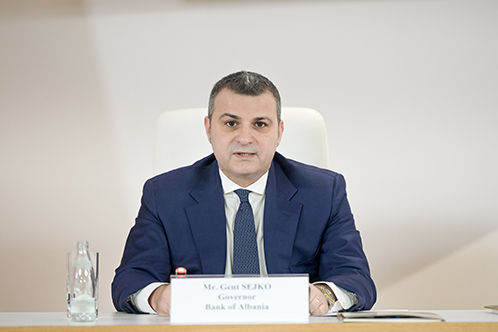
Having this meeting in person conveys an important message. Global economy is leaving behind the worst days and the heaviest consequences triggered by the pandemic over the course of the past two years. Nevertheless, in our horizon as policy makers - also in the daily economic life of each business and household - a new challenge has emerged. The Russia’s military attack on Ukraine and the implemented sanctions drove to a sharp upsurge in the prises of foods, oil, energy products and raw materials across international markets. Amid a considerable uncertainty, the available information suggests that prices will continue to remain high, at least, even in the rest of 2022.
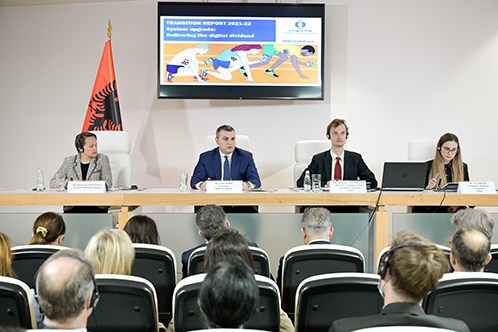
Availing the opportunity of this public communication, and before going through the main messages of this Transition Report, allow me to briefly present the view of the Bank of Albania on the expected impact of this shock and the measures that both the public and private authorities should take to deal with it.
As I previously highlighted, Albania and the region are facing a new reality of prices and uncertainty in global markets. As small open economies we cannot escape the consequences of this reality. Overall, the Albanian economy will experience an increased cost on households, enterprises and public sector’s balance sheets, over a long-term horizon.
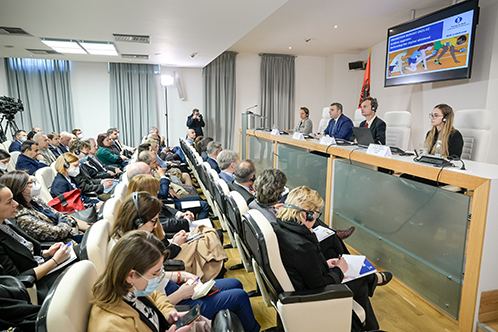
How does this affect the Albanian Economy?
- First, the negative aspect. Based on the current information, our projections suggest inflation to remain above the target in the most part in the next two years. At the same time, profit margins of enterprises will be under pressure and debt servicing costs will climb.
- Second, the positive aspect. Even in presence of this shock, our projections suggest that the volume of the economic activity in Albania will grow during 2022. This forecast takes into account - in one hand - the assumption on the halt in the conflict aggravation, and - on the other hand - the positive moment that the Albanian economy entered 2022, the broadness and the strength of growth sources, and the continuation of a monetary and fiscal stimulating policy mix.
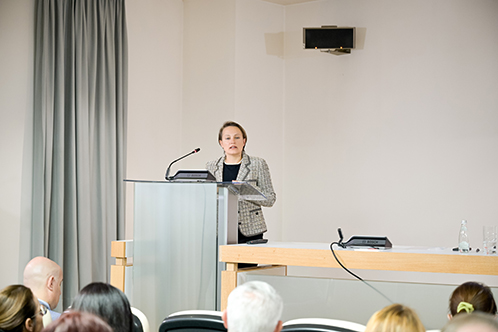
In this context, authorities should have a two-fold focus. First, economic policies should protect from the shock the poorer segments of society and the most vulnerable segments of economy. This objective should be accomplished through a temporary and prudential intervention of fiscal policy, which, in every case, should maximally aim not to be translated into a strong increase of public debt. Second, the risk that the initial supply-side shock be transmitted on the cost and translated into high expected inflation in the future drives to the need to adjust the economic policies stance. To this end, public authorities should rebalance the objective for supporting economic recovery to the risk of jeopardising monetary and financial stability of Albania.
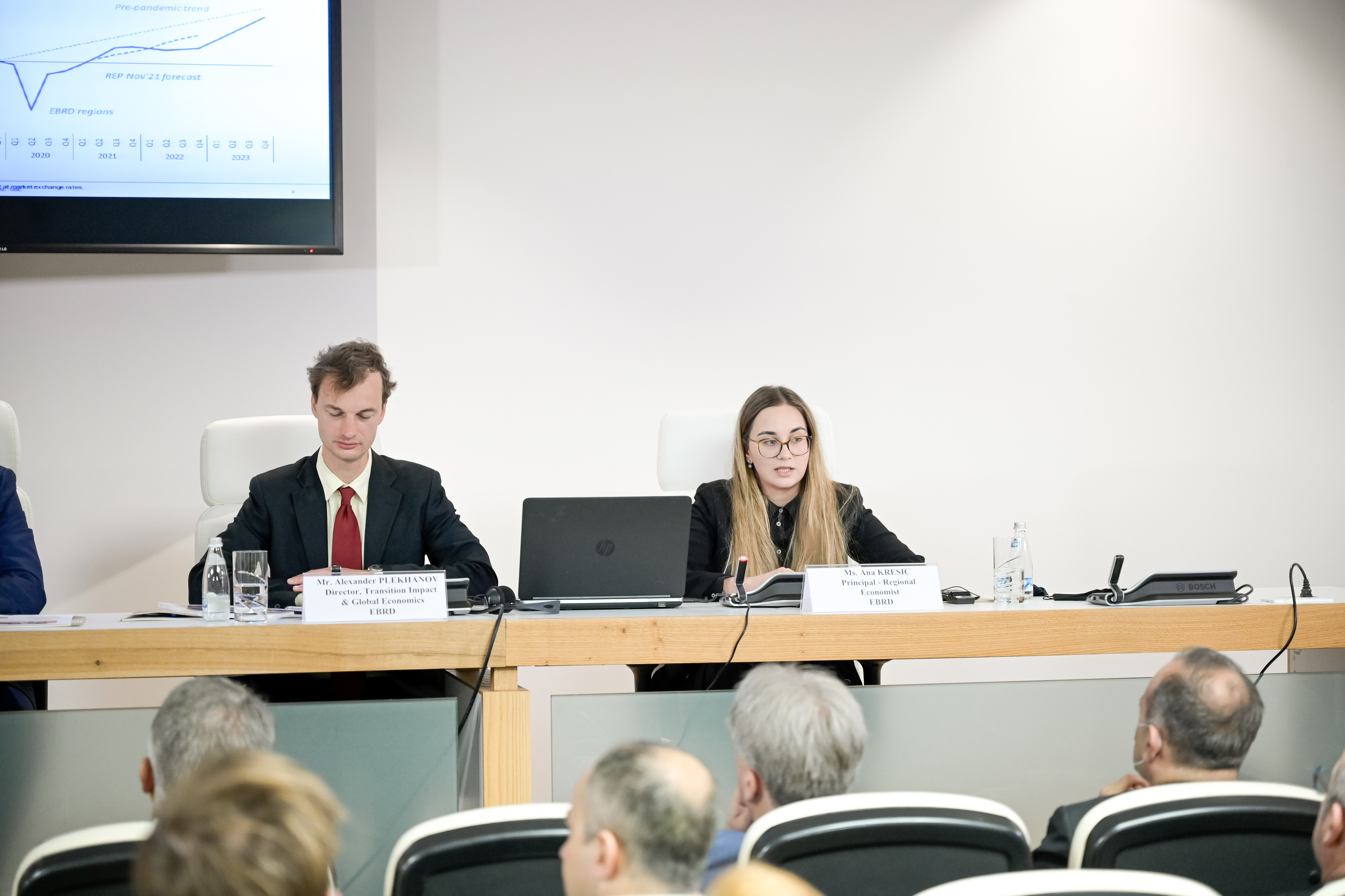
In our vision, the economic and financial equilibrium is a precondition for a sustainable growth. In this context, the increase of policy rate in the last month signals the commitment of the Bank of Albania to safeguard the price stability in Albania. The re-calibration of monetary policy aims at minimising the consequences that price shock will have on: the costs of life; the exchange rate; and on the soundness of the banking sector, in both short run and medium term. At the same time, it is important to highlight, that even after this movement, the Bank of Albania continues to maintain a simulating monetary policy stance to bolstering consumption and investments in Albania.
In parallel with public authorities, private operators should take measures to minimise the consequences of the shock. Overall, the Albanian businesses should pay more attention to operational costs and in particular to energy efficiency. I would like to point out that the direct exposure of the Albanian economy to the countries in conflict has been and continues to remain limited. It means that - in the presence of a stable economic and financial environment - the economic growth prospects remain solid, both in the medium and the long term.
Dear guests,
In the past two years, our experience with crises has illustrated that the successful tackling of shocks is not a casual outcome. In contrary, it reflects the so far achieved progress in structural reforms, the development and sophisticated degree of private sector, and the proactive reaction of economic policies.
I am pleased to see that the Transition Report that will be launched today echoes these three moments.
The Report evidences the further though gradual progress of structural reforms in Albania and regional countries. It promotes the progress made in the last two years, when the attention and main energies were focused on overcoming the consequences from the pandemic. At the same time, the Report underlines that regional countries have achieved a substantial progress in the development of financial market, with specific-targeted reforms which have improved: the market infrastructure; the legal and regulatory framework; the financial instruments; and the market depth. The progress of financial market reforms coupled with those that enable the establishment of an operational capital market, is indispensable to enhance the diversification of financial instruments, while it is still a free potential to our economies.
Digitalisation is the common thread of the Transition Report for this year. Addressing the pandemic has accelerated the digitalisation trend that had started in many aspects of our life and work. Benefits from digitalisation, in terms of increasing productivity efficiency and access in finance, are well documented. The Report notes that this process was even faster across our region, in turn contributing to the increase of competition, the preservation of jobs throughout the pandemic and their increase once the economies were opened.
The Bank of Albania has assessed and promoted the application of information technology and the digitalisation in the financial system since the beginning. In this regard, it has been worked on: promoting the higher use of technology in the payment system; improving and strengthening the regulatory framework for the electronic payment institutions; and the protection of consumers and borrowers.
To further increase the technological skills and to benefit from the related technological dividend, I deem that both the Albanian and regional authorities should continue the implementation of specific structural reform, which aim to:
- support the digitalisation and technology innovation, as an instrument to increase productivity and competition, through: enhancing digital skills; increasing digital infrastructure and online services; encouraging companies to invest in new technologies; and increasing labour force training;
- further develop financial market and promote capital markets, as an instrument to: support new and innovative enterprises; diversify funding sources; and share the financial risk of entrepreneurs;
- continue the structural reforms aiming at: strengthening competition; improving government; adopting green public policies, and accelerating the integration in regional markets and beyond.
Overall, these reforms should aim at establishing the favourable legal and institutional conditions to underpin the adoption of technological development and the creation of new technologies.
***
Dear guests,
The Transition Report has already consolidated its credentials as a professional and visionary document. In this regard, the 2021-2022 Report, is not an exception. The Report helps all of us: decision-makers, researchers, academics and private sector operators, to perform a complete diagnosis of the so-far progress, as well as of the path and challenges that lie ahead to the economic development and the enhancement of the welfare.
Thank you for your participation and I invite you to contribute for a thoroughly analysis of the messages in this Report.
Thank You!

 Twitter
Twitter
 Youtube
Youtube
 Facebook
Facebook
 Flickr
Flickr
 RSS
RSS
 Subscribe
Subscribe
 Feedback
Feedback